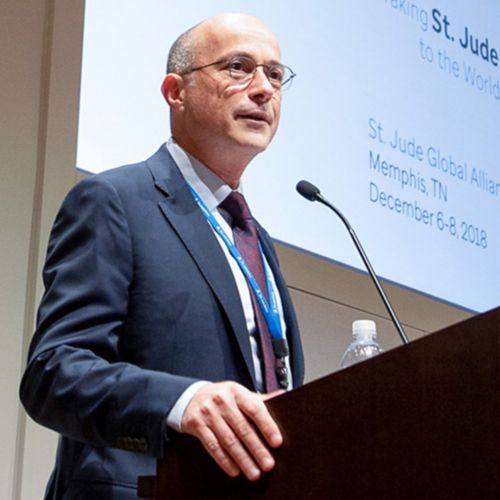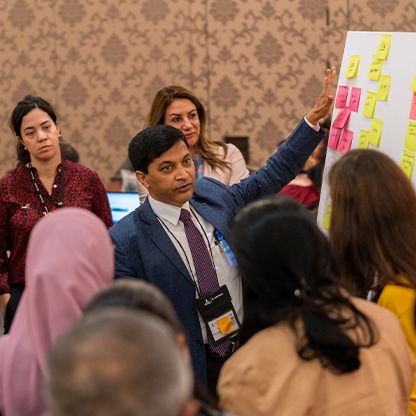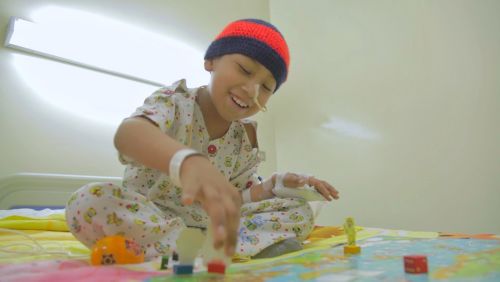St. Jude Family of Websites
Explore our cutting edge research, world-class patient care, career opportunities and more.
St. Jude Children's Research Hospital Home

- Fundraising
St. Jude Family of Websites
Explore our cutting edge research, world-class patient care, career opportunities and more.
St. Jude Children's Research Hospital Home

- Fundraising
Eastern Mediterranean Regional Program
Other Regional Programs:
The St. Jude Global Eastern Mediterranean Regional Program aims to increase access to quality care for children with cancer and other catastrophic diseases.
To achieve this goal, the program supports the creation of partnerships and cooperative regional networks of healthcare providers to build capacity, strengthen educational and research programs and reinforce advocacy and resource mobilization in the region.
The program builds on work that began more than two decades ago, using the former twinning model. At that time, the work focused on four partner sites in three countries: Lebanon (Beirut), Jordan (Amman) and Morocco (Casablanca and Rabat). In the ensuing years, St. Jude has collaborated with more than 80 institutions in 28 countries across the region, helping develop national programs, unified standard of care protocols and cancer networks.
In recent years, St. Jude Global has adopted a tiered model to expand its reach in the region, employing strategic planning of collaborative workshops and development of structured working groups at the regional, country and hospital levels. The Eastern Mediterranean Regional Program offers a platform for collaboration with key stakeholders, such as local leaders, government and hospital administrators and international organizations.
Regional Initiatives
St. Jude has developed extensive collaborative partnerships in the Eastern Mediterranean region. These partnerships have transitioned from the activities and programs first developed under St. Jude’s International Outreach Program to current engagement with more than 80 centers. Working in conjunction with these partners, St. Jude Global has developed fellowship and training programs to increase the number of well-qualified healthcare professionals and experts in the region, thus improving access to care for many children with cancer.
Other initiatives have focused on:
- Developing local and regional cancer programs.
- Expanding the regional network of providers of pediatric cancer care.
- Providing consultation services.
- Conducting collaborative research endeavors.
St. Jude Global collaborations are currently focused on developing and implementing programs, projects and initiatives in alignment with the pillars of education, capacity building and research.
Regional Engagements
Pediatric Oncology East and Mediterranean Group
The Pediatric Oncology East and Mediterranean Group (POEM) launched in 2013. POEM’s mission is to continually improve pediatric oncology care, research, training and advocacy in the region through integrated teamwork. The group’s network of physicians, scientists and healthcare professionals is spread across more than 80 childhood cancer centers in the Middle East, northern Africa and southern Asia.
National Programs
While the regional approach is crucial to building a collaborative global network, national programs are key to improving health care systems in the region’s diverse countries. To that end, the Eastern Mediterranean program is bringing together key stakeholders to help build national programs that advocate to improve access to quality care for all children with cancer in each country. This effort has included successful engagements in Morocco, Pakistan and Palestine.
Cancer Care for Displaced Children
Relationships with partner institutions in Lebanon and Jordan set the foundation for a strong network to ensure continuity of care for children with cancer who are displaced. The war in Syria resulted in a large refugee and displacement crisis in the region. Lebanon took in the highest number of refugees per capita, followed by Jordan. A crisis fund has ensured uninterrupted cancer care for displaced children with cancer. In addition, St. Jude Global has provided guidance and oversight in budgeting, prioritization and allocation of resources to save the maximum number of lives with available funds and local capacity. In parallel with the assistance for displaced children in Lebanon and Jordan, the Eastern Mediterranean Regional Program initiated a long-term plan in 2013 to support capacity building in Syria, aimed at preparing for the return of displaced children. The resultant program has created a strong network for care of childhood cancer in Syria, which has played a vital role in assisting children with cancer displaced by the earthquake in February 2023.
Our Team
-
View Details
Sima Jeha, MD
Member, St. Jude Faculty
Director, Eastern Mediterranean Region, St. Jude Global
Sima Jeha, MD
Member, St. Jude Faculty
Director, Eastern Mediterranean Region, St. Jude Global
Affiliations
Research Interests
- Developmental therapeutics
- Protocol development and clinical investigations in leukemia
- Relapsed and refractory leukemia
- Leukemia in the adolescent and young adult
Contact Information
Sima Jeha, MD
Global Pediatric Medicine
MS 721, Room S2034
St. Jude Children's Research Hospital
262 Danny Thomas Place
Memphis, TN
-
View Details
Gokhan Gulten, MBA, MSc
Project Coordinator, Eastern Mediterranean Regional Program
Gokhan Gulten, MBA, MSc
Project Coordinator, Eastern Mediterranean Regional Program
Affiliations
Short Biography
Gokhan Gulten is a Project Coordinator, Eastern Mediterranean Regional Program for the department of Global Pediatric Medicine. Gokhan obtained his MBA degree in Germany with a specialization in sustainability, MSc degree in Chemical Engineering in Portugal and the UK, and BSc degree in Chemistry in Turkey. He has worked as a business and environmental consultant, assistant supply chain manager, and project coordinator in Chile, and as a climate pioneer, research analyst, and academic assistant in Germany.
Gokhan is deeply interested in applying his strong background in science and project management for furthering St. Jude’s Mission. He likes to have an active role in non-governmental and non-profit organizations and to participate in international projects. Gokhan is very excited to utilize his experiences in diverse multi-cultural environments in the upcoming St. Jude Global projects including coordinating the development of new national programs and the execution of regional initiatives.
Aside from work, Gokhan enjoys hiking, playing the guitar, and stand-up paddling.
Contact Information
Gokhan Gulten, MBA, MSc
St. Jude Children's Research Hospital
262 Danny Thomas Place
Memphis, TN 38105-3678
-
View Details
Asim Belgaumi, MD, BS
Regional Hub Director – Eastern Mediterranean Region
Affiliations
Short Biography
Asim Belgaumi, M.B., B.S., Member, joined the Department of Global Pediatric Medicine as the Regional Hub Director for the Eastern Mediterranean Region.
Throughout his career, Dr. Belgaumi has been a vital partner for St. Jude in the Eastern Mediterranean region. He completed his fellowship in Pediatric Hematology/Oncology at St. Jude between 1994 and 1997 and has served as the Co-Chair for the St. Jude Global Eastern Mediterranean Regional Program’s Regional Advisory Committee. Dr. Belgaumi has held a variety of prestigious positions at King Faisal Specialist Hospital & Research Center, Sidra Medical & Research Center, and Weill Cornell Medical College in Qatar, among other organizations. Most recently, Dr. Belgaumi returned to the Aga Khan University in Karachi, where he served as the Chief Medical Officer and Associated Dean for Clinical Affairs and was a Professor of Pediatric Hematology/Oncology.
Dr. Belgaumi’s areas of interest include treatment of pediatric leukemias and lymphomas, and research in the low and middle-income countries. Recently he has focused on national and regional development of care for children with cancer and has been instrumental in research education and implementation of clinical trials in the Eastern Mediterranean region.
Contact Information
-
View Details
Steffi Varughese, MD
Program Coordinator – Eastern Mediterranean Regional Hub
Affiliations
Short Biography
Dr. Steffi Ann Varughese, MBBS, MD (Community Medicine), is a dynamic healthcare professional with extensive experience in public health, program management, and healthcare quality improvement. With proven expertise in stakeholder engagement, data-driven decision-making, and capacity building, she has successfully led initiatives in disease prevention, healthcare quality improvement, and workforce training.
She has been a part of large-scale health initiatives, including TB elimination programs and disaster management strategies, demonstrating exceptional skills in strategic planning, data analysis, and stakeholder engagement. With a strong foundation in healthcare systems, compliance, and capacity building, Dr. Varughese excels in optimizing operations, enhancing patient care, and driving organizational efficiency. Her leadership, analytical mindset, and commitment to health equity positions her as a valuable asset in healthcare institutions, delivering innovative and sustainable solutions.
Steffi was drawn to St. Jude's because of its state-of-the-art health care and research for children, which focuses on health care delivery regardless of their ability to pay. Their commitment to both clinical excellence and compassion deeply resonates with her. Steffi's values and purpose are naturally aligned with St. Jude. This chance to make a significant impact on pediatric health and join a group that values equity, hope, and innovation is inspiring.










